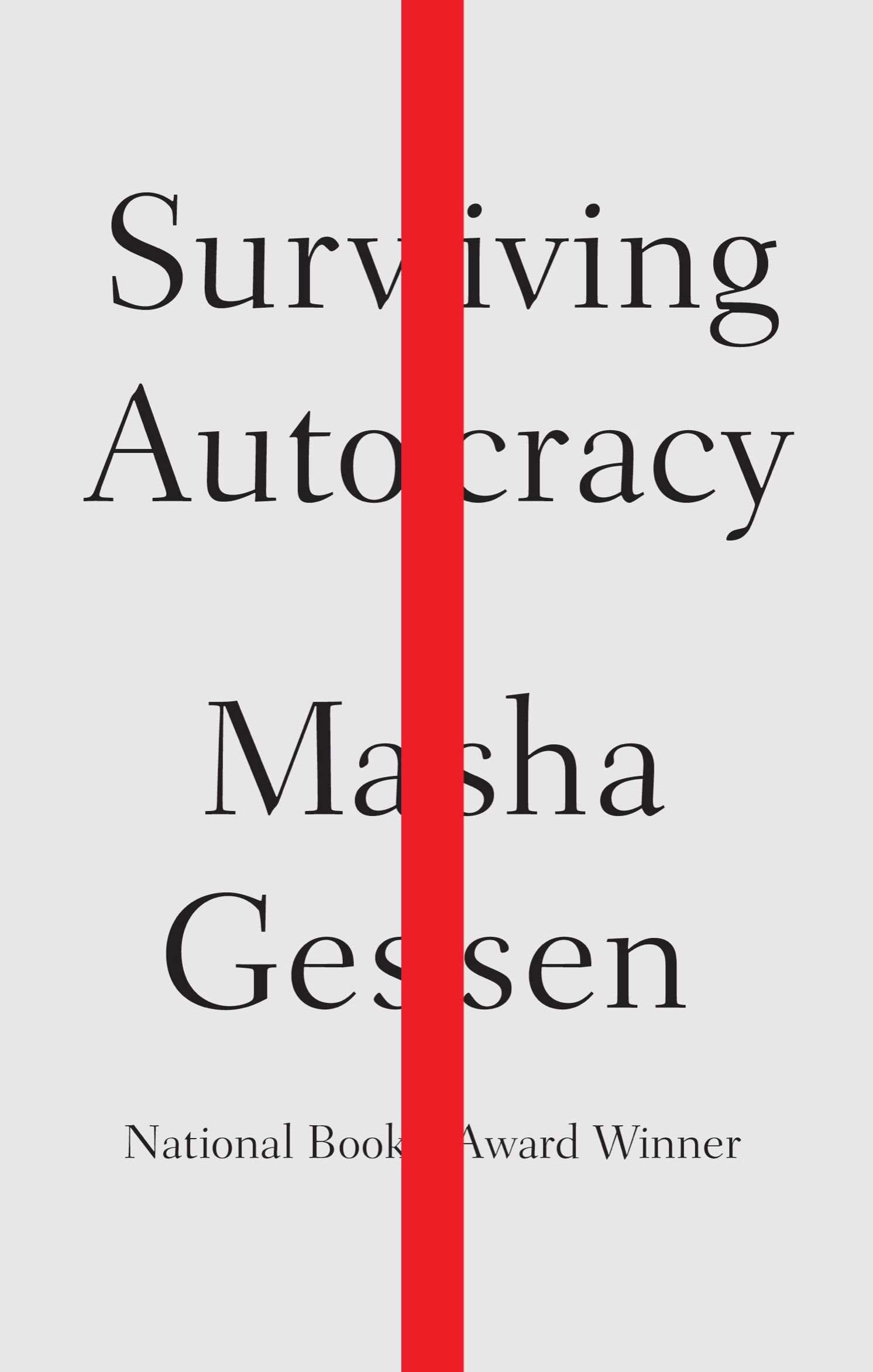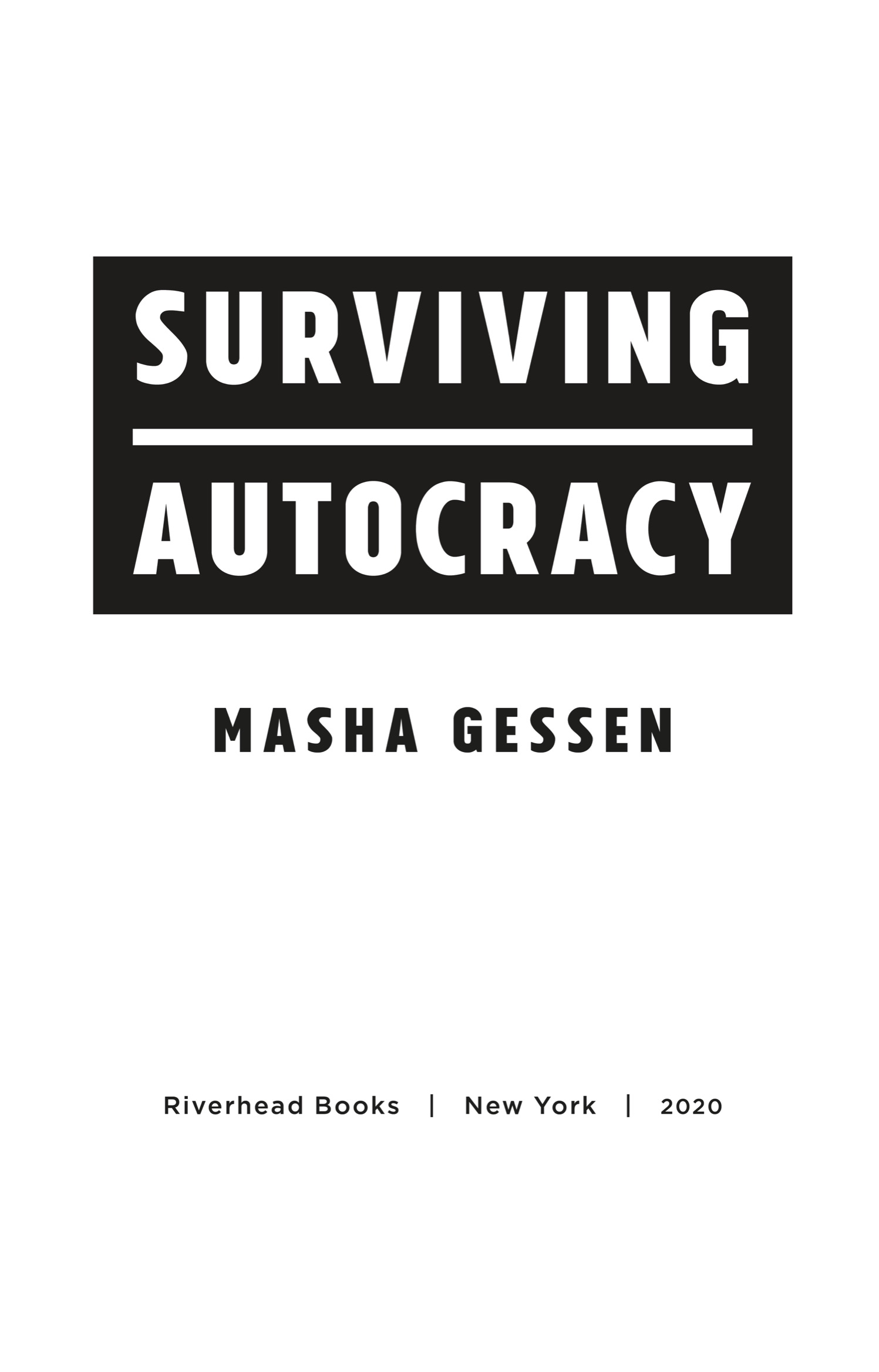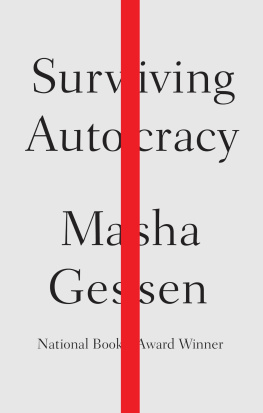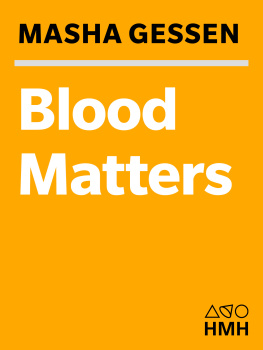Masha Gessen - Surviving Autocracy
Here you can read online Masha Gessen - Surviving Autocracy full text of the book (entire story) in english for free. Download pdf and epub, get meaning, cover and reviews about this ebook. year: 2020, publisher: Penguin Publishing Group, genre: Politics. Description of the work, (preface) as well as reviews are available. Best literature library LitArk.com created for fans of good reading and offers a wide selection of genres:
Romance novel
Science fiction
Adventure
Detective
Science
History
Home and family
Prose
Art
Politics
Computer
Non-fiction
Religion
Business
Children
Humor
Choose a favorite category and find really read worthwhile books. Enjoy immersion in the world of imagination, feel the emotions of the characters or learn something new for yourself, make an fascinating discovery.
- Book:Surviving Autocracy
- Author:
- Publisher:Penguin Publishing Group
- Genre:
- Year:2020
- Rating:3 / 5
- Favourites:Add to favourites
- Your mark:
- 60
- 1
- 2
- 3
- 4
- 5
Surviving Autocracy: summary, description and annotation
We offer to read an annotation, description, summary or preface (depends on what the author of the book "Surviving Autocracy" wrote himself). If you haven't found the necessary information about the book — write in the comments, we will try to find it.
Surviving Autocracy — read online for free the complete book (whole text) full work
Below is the text of the book, divided by pages. System saving the place of the last page read, allows you to conveniently read the book "Surviving Autocracy" online for free, without having to search again every time where you left off. Put a bookmark, and you can go to the page where you finished reading at any time.
Font size:
Interval:
Bookmark:

DeadAgain: The Russian Intelligentsia After Communism
Ester and Ruzya: How My Grandmothers Survived Hitlers War and Stalins Peace
Blood Matters: From Inherited Illness to Designer Babies, How the World and I Found Ourselves in the Future of the Gene
Perfect Rigor: A Genius and the Mathematical Breakthrough of the Century
The Man Without a Face: The Unlikely Rise of Vladimir Putin
Words Will Break Cement: The Passion of Pussy Riot
Gay Propaganda: Russian Love Stories (editor)
The Brothers: The Road to an American Tragedy
Where the Jews Arent: The Sad and Absurd Story of Birobidzhan, Russians Jewish Autonomous Region
Never Remember: Searching for Stalins Gulags in Putins Russia (with photographer Misha Friedman)
The Future Is History: How Totalitarianism Reclaimed Russia


RIVERHEAD BOOKS
An imprint of Penguin Random House LLC
penguinrandomhouse.com

Copyright 2020 by Masha Gessen
Penguin supports copyright. Copyright fuels creativity, encourages diverse voices, promotes free speech, and creates a vibrant culture. Thank you for buying an authorized edition of this book and for complying with copyright laws by not reproducing, scanning, or distributing any part of it in any form without permission. You are supporting writers and allowing Penguin to continue to publish books for every reader.
Portions of this book previously appeared, in different form, in The New Yorker, The New York Times, The New York Review of Books, and Harpers.
Let America Be America Again from The Collected Poems of Langston Hughes by Langston Hughes, edited by Arnold Rampersad with David Roessel, Associate Editor, copyright 1994 by the Estate of Langston Hughes. Used by permission of Alfred A. Knopf, an imprint of the Knopf Doubleday Publishing Group, a division of Penguin Random House LLC, and Harold Ober Associates. All rights reserved.
Riverhead and the R colophon are registered trademarks of Penguin Random House LLC.
Library of Congress Cataloging-in-Publication Data
Names: Gessen, Masha, author.
Title: Surviving autocracy / Masha Gessen.
Description: New York : Riverhead Books, 2020. | Includes bibliographical references.
Identifiers: LCCN 2020003180 (print) | LCCN 2020003181 (ebook) | ISBN 9780593188934 (hardcover) | ISBN 9780593188941 (ebook)
Subjects: LCSH: Trump, Donald, 1946 Influence. | AuthoritarianismUnited States. | DictatorshipUnited States. | Political cultureUnited States. | United StatesPolitics and government2017 Classification: LCC E912 (print) | LCC E912 (ebook) | DDC 973.933dc23
LC record available at https://lccn.loc.gov/2020003180
LC ebook record available at https://lccn.loc.gov/2020003181
While the author has made every effort to provide accurate citation links at the time of publication, neither the publisher nor the author assumes any responsibility for errors, or for changes that occur after publication. Further, the publisher does not have any control over and does not assume any responsibility for author or third-party websites or their content.
Cover design by Jason Booher
pid_prh_5.5.0_c0_r0
PROLOGUE
Donald Trumps entire repertoire had long been familiar to Americans by the time he decided to address the nation on the evening of March 11, 2020, about the pandemic of the novel coronavirus. We knew Trumps range: government by gesture; obfuscation and lying; self-praise; stoking fear and issuing threats. He had repeatedly dismissed the coronavirus as a minor flu and even a hoax; he had predicted that it would miraculously vanish. It had been two months since China, where the disease appeared first, had made the genetic code of the virus publicly available. The United States had wasted most of that time. Hospitals were not equipped to face the looming onslaught of patients. Protective equipment was in short supply. Essential information had been kept secret by the White House. Testing was not available. Now the virus was spreading in the country, it was too late for prevention, and no one had a plan for mitigation or suppression. Panic was starting to rise in Washington state, where the first diagnosed American deaths occurred, in California, New York, and elsewhere. Trump finally appeared on television.
He performed his entire repertoire. He announced that he was banning travelers coming in from Europethis was his grand gesture. He boasted of responding with great speed and professionalism, promised widespread testing and effective antiviral therapies, and asserted that insurance companies would waive all copayments for treatments; this was the obfuscation and lying. These pledges blended seamlessly with self-praise, which included calling the American effort the most aggressive and comprehensive, claiming to have handled the epidemic better than European countries had, and assuring his audience that the United States was well prepared. None of this was true. Finally, the fearmongering came when Trump called COVID-19 a foreign virus, pointing the finger at Europe. Soon, he would home in on a better namethe Chinese virusand hate crimes against Asian-Americans would spike.
Trump apparently read from a teleprompter that night. He sounded grave. This was, in other words, one of those times when Trump sounded presidential to some people, because he didnt sound entirely deranged. For example, former Ohio governor John Kasich, a Republican, defended Trump on CNN, saying that he did fine, in part because he read from a script. But precisely because Trump was not at his worstjust his ordinary obfuscating and self-aggrandizing selfin the extraordinary situation of the pandemic, what we were witnessing was peak Trump.
Over the next few weeks, Trump would shirk responsibility for the crisis, at one point saying literally, No, I dont take responsibility at all, when he was asked about a lack of access to testing. He would tell governors to figure out their own ways of procuring supplies, and he would offer no guidance on policy. He would take the podium at the White House during almost daily briefings and issue bogus medical advice, such as extolling the virtues of untested drugs, which some people then rushed to use. He would resist calls to invoke the Defense Production Act, to compel companies to turn their facilities over to manufacturing essential equipment, evidently for fear of cutting into the profits of his corporate cronies. All along, he would praise his own intelligence and approach. The television networks would broadcast these sessions live; the newspapers would report on them, and Trumps other coronavirus-related pronouncements, as though they were the stuff of an intelligible presidency, with positions, principles, and a strategy. As a result, even as hospitals across the country buckled, people died, and the economy tanked, more than half of all Americans claimed to approve of Trumps response to the pandemic.
Font size:
Interval:
Bookmark:
Similar books «Surviving Autocracy»
Look at similar books to Surviving Autocracy. We have selected literature similar in name and meaning in the hope of providing readers with more options to find new, interesting, not yet read works.
Discussion, reviews of the book Surviving Autocracy and just readers' own opinions. Leave your comments, write what you think about the work, its meaning or the main characters. Specify what exactly you liked and what you didn't like, and why you think so.














